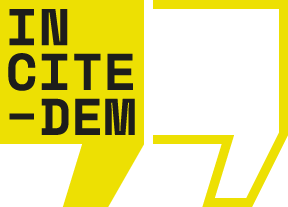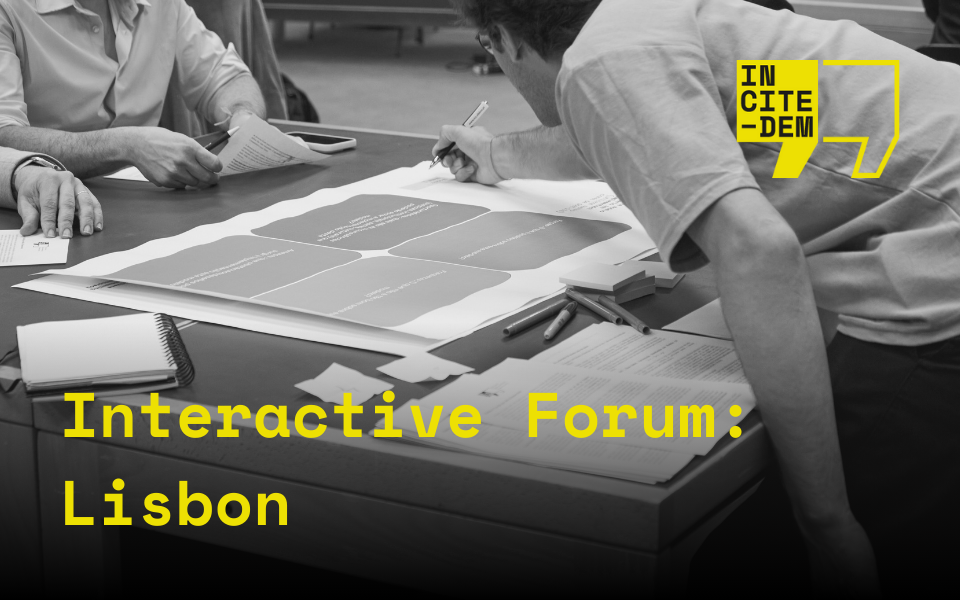On June 24th, the Portuguese edition of the INCITE-DEM Interactive Fora took place at the Calouste Gulbenkian Foundation in Lisbon, bringing together 16 policymakers, public officials and technical staff from local and national institutions. The aim was to assess the feasibility, adaptability, and impact of six democratic innovations models co-designed by citizens across Europe.
This was one of nine Interactive Fora organised across Europe in 2025, where institutional actors are recruited to reflect on how citizen-generated models might be integrated into governance structures, and what adaptations are needed to make them work in practice.

Forum Design and Methodology
The Lisbon forum opened with an introduction to the INCITE-DEM project and the process through which 31 democratic innovations developed in the 2024 Democracy Labs were synthesised into six representative models: The Neighbourhood House, The Permanent Citizen Assembly, The Participation Navigation App, The Democracy Allowance, The Democracy Laboratories, and The Inclusive Citizen Consultation. Each table was assigned two models for group discussion, with facilitators guiding participants through three exercises of reflection:
– Exercise 1: Identifying strengths, weaknesses, opportunities, and threats.
– Exercise 2: Suggesting adjustments to increase feasibility, inclusion, and effectiveness.
– Exercise 3: Reflecting on how each model might affect democracy, equality, and sustainability.
Discussions were documented through notes, post-its, and plenary presentations, resulting in
a lively exchange of perspectives grounded in practical experience.

Key Insights from Lisbon
Across the six models participants highlighted both the promise and the challenges of
embedding democratic innovations into Portugal’s institutional landscape:
Political and Institutional Feasibility:
– Many models rely heavily on stable political will and sustained funding, thus leaving them vulnerable to electoral cycles and budget cuts at present.
– Institutional articulation was flagged as crucial: innovations should complement rather than compete with representative bodies.
Clarity of Design and Governance
– Several proposals required clearer rules, mandates, and processes to avoid confusion or redundancy.
– Simpler, well-defined structures were considered more likely to succeed than complex arrangements.
Inclusion and Representativeness
– Participants stressed that inclusion cannot be assumed: models risk reinforcing inequalities if not designed with attention to territorial, generational, and digital divides.
– Active outreach to underrepresented groups, along with accessible formats (physical and digital), was considered essential.
Digital Tools and Participations Channels
– Digital platforms (such as the Participation App) offer new opportunities for engagement and feedback, but also raise concerns about exclusion of digitally less confident groups and the environmental footprint of AI.
– Hybrid approaches — linking digital participation to physical spaces like Neighbourhood Houses or Democracy Labs — were seen as the most promising.
Impact of Civic Culture
– Many models were valued for their potential to strengthen civic education, build solidarity, and nurture intergenerational learning.
– However, risks of frustration and disengagement were noted if participation processes lack clarity, feedback, or visible results.

Moving Forward
The Lisbon Interactive Forum shows that democratic innovations can act as catalysts for community-building, inclusive governance, and responsive decision-making as long as they are carefully adapted to local contexts. Across the six models, participants balanced enthusiasm for experimentation with sober recognition of institutional and social constraints.
The insights gathered in Lisbon will contribute to INCITE-DEM’s broader effort to refine citizen-driven democratic innovations and develop policy recommendations for their integration across Europe.

